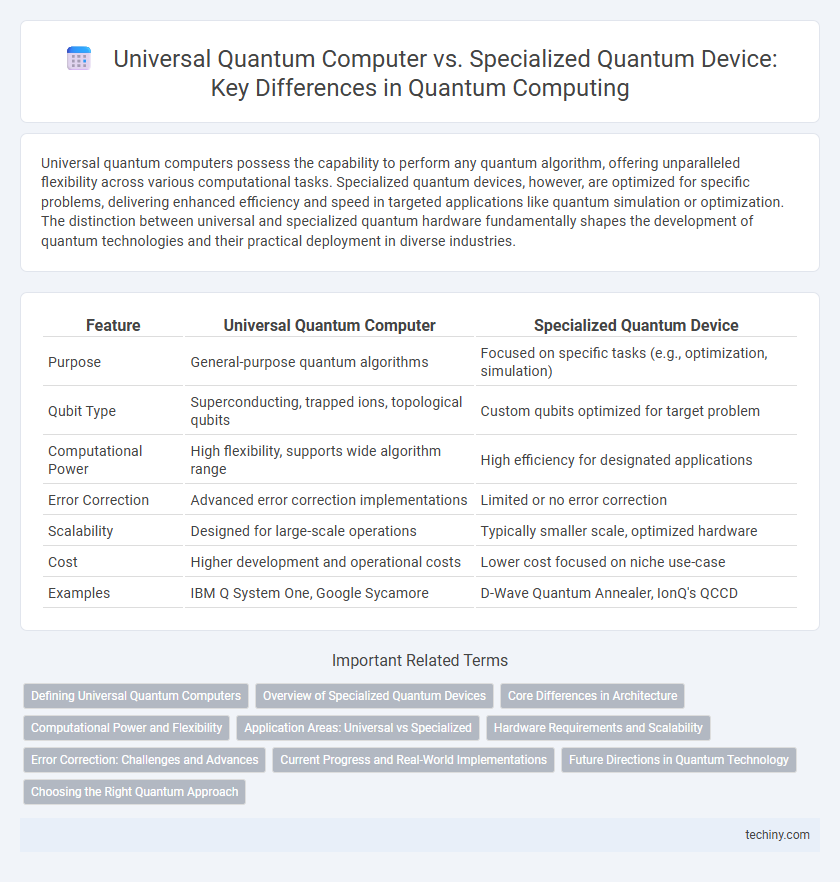Universal quantum computers possess the capability to perform any quantum algorithm, offering unparalleled flexibility across various computational tasks. Specialized quantum devices, however, are optimized for specific problems, delivering enhanced efficiency and speed in targeted applications like quantum simulation or optimization. The distinction between universal and specialized quantum hardware fundamentally shapes the development of quantum technologies and their practical deployment in diverse industries.
Table of Comparison
| Feature | Universal Quantum Computer | Specialized Quantum Device |
|---|---|---|
| Purpose | General-purpose quantum algorithms | Focused on specific tasks (e.g., optimization, simulation) |
| Qubit Type | Superconducting, trapped ions, topological qubits | Custom qubits optimized for target problem |
| Computational Power | High flexibility, supports wide algorithm range | High efficiency for designated applications |
| Error Correction | Advanced error correction implementations | Limited or no error correction |
| Scalability | Designed for large-scale operations | Typically smaller scale, optimized hardware |
| Cost | Higher development and operational costs | Lower cost focused on niche use-case |
| Examples | IBM Q System One, Google Sycamore | D-Wave Quantum Annealer, IonQ's QCCD |
Defining Universal Quantum Computers
Universal quantum computers leverage qubits to perform any computational task by executing a complete set of quantum gates, enabling algorithms like Shor's and Grover's at scale. Unlike specialized quantum devices designed for particular problems such as quantum annealers or simulators, universal quantum computers provide flexibility through programmability and error correction protocols. Their architecture supports general-purpose quantum algorithms, making them foundational for advancing quantum supremacy and solving complex problems across cryptography, optimization, and material science.
Overview of Specialized Quantum Devices
Specialized quantum devices are designed to solve specific problems more efficiently than universal quantum computers by leveraging tailored quantum algorithms and hardware. These devices excel in areas such as quantum annealing for optimization tasks or quantum simulators for modeling complex quantum systems with fewer qubits. Their focused architecture enables faster development and practical applications in fields like materials science, cryptography, and machine learning, despite lacking the broader versatility of universal quantum computers.
Core Differences in Architecture
Universal quantum computers utilize a scalable architecture with qubits that perform arbitrary quantum gate operations, enabling them to solve a wide range of computational problems. Specialized quantum devices, often known as quantum annealers or analog quantum simulators, have fixed architectures designed to optimize specific tasks such as optimization or material simulation. The core architectural difference lies in programmability and flexibility, where universal quantum computers support full quantum error correction and complex algorithms, whereas specialized devices focus on tailored hardware configurations to enhance performance for predefined applications.
Computational Power and Flexibility
Universal quantum computers offer unparalleled computational power and flexibility by enabling the execution of any quantum algorithm, making them suitable for a wide range of applications from cryptography to quantum simulations. Specialized quantum devices, often designed for specific tasks like quantum annealing or optimization problems, deliver higher efficiency and performance within their targeted domain but lack the broad programmability of universal systems. The trade-off between these architectures centers on universal quantum computers' versatility versus specialized devices' optimized performance for dedicated problem sets.
Application Areas: Universal vs Specialized
Universal quantum computers offer broad application potential across cryptography, optimization, and complex molecular simulations due to their ability to perform any quantum algorithm. Specialized quantum devices are tailored for specific tasks like quantum annealing in solving combinatorial optimization problems or quantum sensing for high-precision measurements. These specialized systems often deliver enhanced performance and efficiency within their niche applications compared to general-purpose quantum processors.
Hardware Requirements and Scalability
Universal quantum computers demand highly coherent qubits with precise error correction mechanisms, requiring complex hardware architectures such as superconducting circuits or trapped ions to achieve large-scale fault tolerance. Specialized quantum devices, like quantum annealers or photonic processors, often utilize less stringent qubit coherence but focus on optimizing hardware for specific problem classes, enabling more practical near-term scalability. The scalability of universal quantum computers hinges on minimizing noise and implementing modular designs, whereas specialized devices trade universality for tailored hardware efficiency and simpler expansion pathways.
Error Correction: Challenges and Advances
Error correction in universal quantum computers faces significant challenges due to qubit decoherence and gate fidelity, requiring complex error-correcting codes like surface codes to maintain computational reliability. Specialized quantum devices, optimized for specific tasks, often implement tailored error mitigation strategies that reduce overhead but limit general applicability. Recent advances in fault-tolerant protocols and hardware improvements have progressively narrowed the error correction gap between universal and specialized quantum technologies.
Current Progress and Real-World Implementations
Universal quantum computers offer broad computational capabilities capable of simulating any quantum algorithm, with progress marked by prototypes from IBM, Google, and Rigetti demonstrating increasing qubit coherence and gate fidelity. Specialized quantum devices, such as quantum annealers from D-Wave and photonic quantum simulators, provide tailored solutions for optimization and sampling tasks, achieving practical advantages in certain real-world applications like logistics and material science. Hybrid quantum-classical systems are also emerging to leverage near-term quantum hardware strengths, accelerating advancements in drug discovery, cryptography, and complex system modeling.
Future Directions in Quantum Technology
Future directions in quantum technology emphasize developing universal quantum computers for broad computational tasks while advancing specialized quantum devices tailored to specific problems like optimization or simulation. Universal quantum computers offer scalability and adaptability, potentially revolutionizing cryptography, machine learning, and complex system modeling. Specialized devices provide near-term applicability with optimized architectures, enhancing performance on targeted algorithms and accelerating quantum advantage in practical scenarios.
Choosing the Right Quantum Approach
Selecting the appropriate quantum technology depends heavily on the problem's complexity and scalability requirements, with universal quantum computers offering broad computational capabilities through qubit superposition and entanglement. Specialized quantum devices, such as quantum annealers or simulators, excel in niche applications like optimization problems and quantum chemistry by leveraging tailored architectures for speed and precision. Balancing these options involves evaluating algorithm compatibility, error rates, and hardware accessibility to maximize efficiency in quantum problem-solving.
universal quantum computer vs specialized quantum device Infographic

 techiny.com
techiny.com